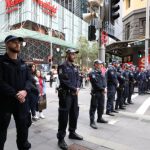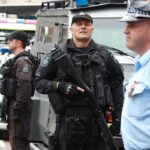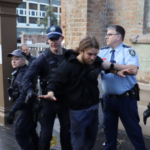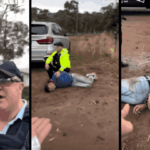The Deployment of ADF Troops for Domestic Disturbances is an Ominous Sign
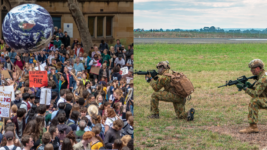
The Australian Defence Forces alerted the Lismore public, via the local council’s Facebook page, that it would be in the vicinity of their town over 6 to 8 September conducting exercises, which would include “riot control” at Lismore Airport and “blank-fire clearance” at old Trinity College.
As well as providing times of day when no “gunfire” should be heard, the ADF added in its post that the exercises were to prepare members of the 7th Brigade “to deploy on Australian government tasks”, meaning this was in anticipation of future deployment of troops in the domestic setting.
Greens Senator David Shoebridge warns that the “political background” to the appearance of fully armed soldiers on the streets of the Northern Rivers town portends to the use of the military upon “residents showing dissent to governments that refuse to address the climate crisis” in the future.
That the ADF chose to hold these riot control exercises in a regional NSW town that experienced two extreme flooding events last year, which almost wiped it off the map and traumatised the entire community, seems an odd random choice or a very sinister purposefully-made decision.
And the fact that the Albanese government-commissioned Office of National Intelligence report into the risks of climate change has been withheld from the public is lending credence to suggestions being made that the domestic military drills relate to the threat of the escalating climate crisis.

Future domestic deployments
“This is wrong on two levels,” Shoebridge made certain. “The first is that these exercises have been carried out in a town that has been traumatised following the disastrous floods that they’re still recovering from.”
“As many people know the ADF was deployed to help those communities following those floods, and many residents have indicated that the return of troops on the streets, including in this case troops that are fully armed and in battle gear, has been a very retraumatising event.”
But the “more fundamental” concern, according to the senator, is that sending in the army to cities and towns to practice riot control is wrong, as there should be a clear differentiation between the roles of the military and civilian police forces, with the latter being called upon to control civil unrest.
And in this sense, the authorities choosing to train the military to be used against the civilian population in this country is “deeply problematic”.
“Many members of the community were grateful for the assistance that the army provided during the floods,” the Australian senator told Sydney Criminal Lawyers. “However, their appearance on the streets fully armed training for riot control has produced a very different reaction.”
Akin to domestic terrorists
Not only is Lismore the site of two climate-driven floods last year, but it’s also known to have a population heavily active in the climate movement and these numbers have likely swelled since the town was destroyed by flood and then received little government assistance in its immediate wake.
The ADF decided to descend upon Lismore with heavily armed troops a fortnight ago, either due to a misguided decision of management to choose this location, or via a distinctly purposeful choice to convey a pointed message to its residents and the climate movement in general.
“Whether it’s at a state or federal level, the growing institutional response to climate disasters and the unsettling conditions they produce in our communities has been one of aggressive policing and now we’re seeing aggressive military deployment to put down civil unrest,” Shoebridge stressed.
This potential militarisation of the response to climate defenders is simply another step in the direction that state governments have been taking to nonviolent direct actions that climate defenders have been conducting in urban and regional settings to raise climate awareness.
The NSW government passed laws in April last year that see climate defenders conducting nonviolent direct actions that disrupt a road, major facility, tunnel or bridge facing up to 2 years imprisonment and/or a $22,000 fine.
Victoria and Tasmania followed NSW in August 2022, enacting similar laws carrying time for climate protests, whilst SA followed suit last May, which involved the state opposition leader suggesting such laws on-air one morning and by the afternoon they’d already passed the lower house.
While in WA, the authorities have also declared war upon climate defenders, but they haven’t passed news laws. Instead, WA police have raided activists’ homes, pulled a gun on one agitator and placed violence restraining orders on four nonviolent climate protesters to silence their dissent.
Shoebridge underscores that this heavy-handed law enforcement approach, which is now being increasingly militarised, doesn’t tackle the source of the issue, as “that would require staring down the fossil fuel industry and leaving coal and gas in the ground instead”.
The military versus the people
The Australian government hasn’t suddenly had an epiphany about sending in the troops to deal with civil unrest as was seen two weeks ago, but rather successive governments have long considered this a possibility. Indeed, it’s foreshadowed in the Australian Constitution.
Then attorney general Christian Porter saw the Defence Call Out Bill passed in 2018, which inserted Part IIIAAA into the Defence Act 1903 (Cth). This change provides that states can call upon ADF assistance for domestic unrest, no longer as a last measure, but in order to enhance response.
This legislation suggests that this streamlining of ADF call out is necessary for matters involving domestic violence, which is a term used in section 119 of the Constitution, where it’s taken to mean a domestic threat to a state, or civil unrest, alongside citing the threat of the invasion of a state.
The Porter legislation was followed by another bill introduced in 2020, which provided for the streamlining of the process to send out the army reservist to a range of issues, which include peace enforcement, assisting states with national security or defence, as well as civil disaster relief.
“What we have seen over the last two decades are moves of the federal government to broaden the scope of deployment of the ADF,” Shoebridge underscored.
“Some of the rhetoric coming from the Albanese government is aimed at grey zone activities for the ADF being deployed, not just in wars, but in instances of civil unrest at the discretion of the defence minister,” explained the Greens Senator.
Climate inaction will trigger domestic unrest
The Albanese commissioned ONI climate risk report is suspected to have been in government possession since late last year. And Shoebridge quizzed Senator Penny Wong in May, regarding a number of questions about the secreted report.
The questions taken on notice were only answered recently and has led to speculation as to what the climate risk report might contain, as the responses entailed that the report’s completion, its scope, its findings on climate risks and any recommendations it may have made are all classified.
“We know that the Albanese government is in possession of the ONI report,” said Shoebridge. “Albanese is refusing, not just to release the report, but he’s refusing even to discuss the report, keeping its date hidden and keeping its findings from the eyes of the public.”
The Australian senator added that an obvious conclusion to why federal Labor is refusing to release its report is that it’s probable that it identifies global heating as posing the most drastic risks to this nation.
“It is likely that that report will identify climate risk, rather than the China threat drummed up by the Coalition and Labor, as the most serious risk to national security,” Shoebridge outlined in conclusion.
“What’s troubling is that some of the recommendations and responses from the ONI report may already be being played out with this increase in ‘flexibility’ for deployment in the ADF domestically.”


